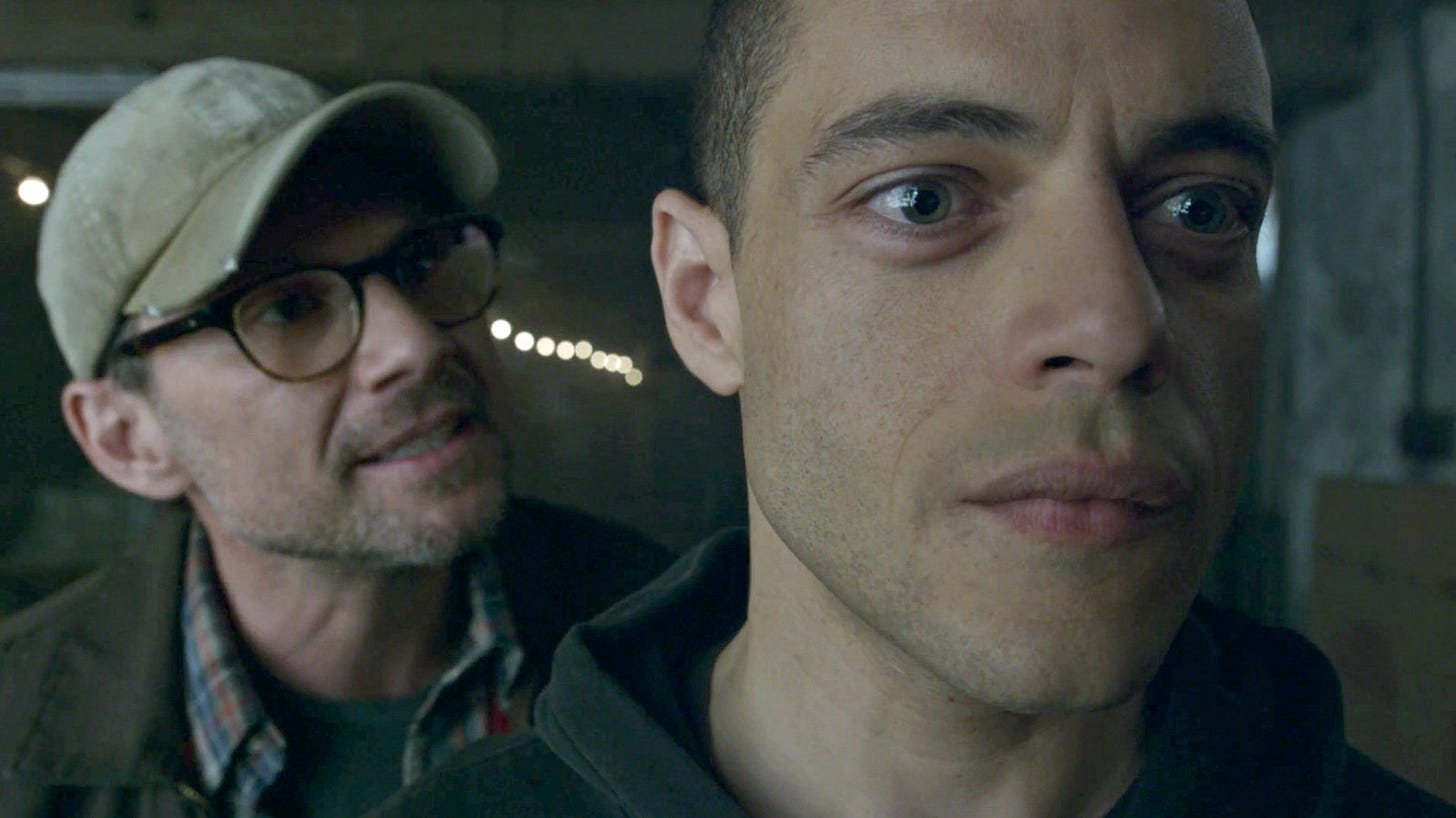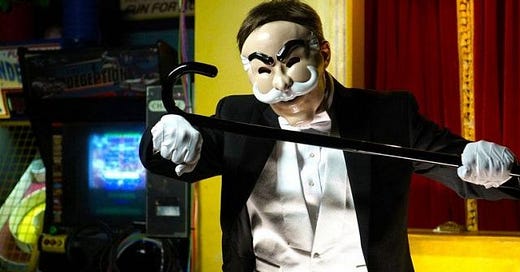Welcome to Barstool Bits, a weekly short column meant to supplement the long-form essays that appear only once or twice a month from analogy magazine proper. You can opt out of Barstool Bits by clicking on Unsubscribe at the bottom of your email and toggling off this series. If, on the other hand, you’d like to read past Bits, click here.
I got sucked into a series on Prime called Mr. Robot, and I gotta say folks, this is one of the greatest series I’ve ever viewed. I rank it with the top five all-time-best television series ever produced. I have in mind the likes of Dennis Potter’s (1935-1994) genius works, The Singing Detective (1986) and Karaoke (1996), and David Milch’s Deadwood (2004-2006). My primary reasoning here is that its metaphorical resonance is true to the point of brilliance, especially as it applies to self development, the journey of self discovery, and the wonders of the inner world. My enthusiasm extends to its prescience with respect to what have become the most salient concerns of our times: namely, the domination of the globalist set—the wealthiest one percent of the wealthiest one percent. The insights this show conveys on the motivations of the most powerful, their view of anyone beneath them as cockroaches, their blithe indifference to murder and human suffering. . . ring true and poignant in the post-lockdown era. Considering the show aired from 2015 to 2019, I find myself agog at the timing. It anticipated a crisis that would bring about a growing societal awareness of the kleptocratic and depraved, psycho deviants at the helm of world affairs.
In contrast to Paul MacInnes—an entertainment hack at The Guardian (you can find his review here)—I did not experience any trouble keeping up “with the many complexities [. . .] of Sam Esmail’s hacking-cum-global conspiracy drama.” Esmail’s vision is clear and consistent, and carried through almost flawlessly to the very end. Those who, like MacInnes, found it “a mess” were likely trying to maintain their Twitter presence while watching. Emily St. James, writing for Vox, got the core message pretty close to spot on:
Sometimes, our brains deal with pain by putting up partitions. And sometimes, those partitions take on personalities of their own. That doesn’t make them less real; it makes them parts of ourselves that have to be reintegrated. The real Elliot has to live his life, and thus, he has to blend his other personas — the Mastermind and Mr. Robot among them — back into his core self, something he accomplishes by series’ end.
Okay. So I better back up now and explain a little. You know it’s about a hacker and a global conspiracy. The hacker part is right. But there’s no conspiracy. Like I said, MacInnes wasn’t paying attention. St. James called the series, “USA’s hacker drama/anti-capitalist manifesto.” That’s not quite right either. Mr. Robot is not anti-capitalist, nor is it a manifesto. Where she got either of these notions is beyond me. I suppose one could call it a hacker drama, but it’s more of a graphic-novel-style thriller.
The protagonist is Elliot Alderson (Rami Malek), a cyber-security programmer by day and a dark, white-hat hacker by night, who confronts evil criminals with their misdeeds and has them arrested by authorities. He meets Mr. Robot (Christian Slater) who recruits him into playing the key role in a hacker group that calls itself fsociety. The goal of this small outfit is to destroy the biggest corporation in the world, E Corp, which everyone calls Evil Corp. Their method is to essentially erase all debt records. The results, however, once achieved, are mayhem and increased poverty. It is worth mentioning that fsociety resembles QAnon in many ways: they use a mask, similar to the Guy Fawkes mask, and they speak to the problems caused by the top one percent of the once percent steering world affairs.
I guess that’s what many see as a conspiracy theory. But I think Mr. Robot shows up something that I’ve been attempting to explain to many who like throwing around the term conspiracy theory these days. . . that really, it’s all just business. I suppose you could deem a board meeting called to cover up a toxic spill a conspiracy, but that’s not what we have in mind when we use the term. Mr. Robot shows how this is essentially what’s going on, along with some backroom meetings between the top of the top dogs.
A lot of the series follows Alderson through his many harrowing encounters with criminals as he wrestles with his own addiction to morphine—a nice old-school touch that brings Dashiell Hammett (1894-1961) to mind and the noir detective genre. Often enough his main goals vis a vis fsociety are thwarted by these activities. Soon we discover that Mr. Robot is Alderson’s deceased father, and that his presence is a psychological projection. In fact, the big reveal in Season 1 is that Alderson suffers from dissociative identity disorder AKA multiple personality. Although this is a plot twist, I’m not spoiling the series. (There’s more than plenty I’m not going to tell.) I bring up the multiple personality problem because it’s central to my theme here at analogy.

Now the quotation from St. James should make more sense. Aren’t we all multiple personalities? And isn’t the goal to find a way to integrate and bring balance to the various personas that make up our one person?—originally persona in the Latin referred to the mask or false face worn by actors. With this element at work in the series, we get meta theatre of the sort Dennis Potter was so great at. Sam Esmail proves himself no slouch as he manages to leverage that meta level throughout, and he does so especially poignantly in the final scene when we ourselves are given back to ourselves as the characters and the actors are ultimately returned to themselves.
As mythologist Joseph Campbell (1904-1987) pointed out in his interview series with Bill Moyers The Power of Myth (1988), our culture tends to recognise only the brain as the significant organ of consciousness. But the brain is only one organ of many housed in the human body. And these organs talk to each other. They have different needs and make various demands. The brain wants to be in charge, to lord it over the rest by establishing a kind of organic tyranny. But what the brain wants is not the life the body wants. There’s also the heart, and the whole cardio vascular apparatus that craves action and love; and there’s the stomach and the whole gastrointestinal apparatus that takes pleasure in smelling, tasting and internalising the world; and there are the filtration systems, the kidneys and liver that crave toxins, the sexual organs that crave sex and so on. The brain is just one among these many in an internal ecosystem we barely understand.
Psychiatrist and neuroimaging scientist, Iain McGilchrist, indicates a similar principle at work between the left and right hemispheres of the brain in his monumental The Master and His Emissary (2009)—where the characters involved are (very broadly speaking) that part of us that seeks to manipulate and control, and that part that seeks to interpret and understand. . . what I have called in “Educating the Analogical Mind” the analytical and the analogical minds.
Poet Ted Hughes (1930-1988) also spoke to this issue in his essay “Myth and Education” (circa 1970) which I feel is worth quoting here:
We can guess, with a fair sense of confidence, that all these intervolved processes, which seem like the electrical fields of our body’s electrical installations — our glands, organs, chemical transmutations and so on — are striving to tell about themselves. They are all trying to make their needs known, much as thirst imparts its sharp request for water. They are talking incessantly, in a dumb radiating way, about themselves, about their relationships with each other, about the situation of the moment in the main overall drama of the living and growing and dying body in which they are assembled, and also about the outer world, because all these dramatis personae are really striving to live, in some way or other, in the outer world. That is the world for which they have been created. That is the world which created them. And so they are highly concerned about the doings of the individual behind whose face they hide. Because they are him. And they want him to live in the way that will give them the greatest satisfaction.
Sam Esmail’s Mr. Robot captures this very same quintessence of our humanity in his psychologically fractured hero, Elliot Alderson. Ultimately, Alderson must relinquish his obsession with computers and hacking and prying into everyone’s secrets to manipulate them. This is the work of his Mastermind persona, of his left-brain persona, of his heartless persona, and not the beautiful totality of his being. It is toward this spiritual state of inner harmony that he reaches in the final season. This is why I admire this series and place it among the top five of all time. Seldom does a television drama attempt to communicate these profound understandings. Seldom does television appeal so marvellously to the whole human experience.
Asa Boxer’s poetry has garnered several prizes and is included in various anthologies around the world. His books are The Mechanical Bird (Signal, 2007), Skullduggery (Signal, 2011), Friar Biard’s Primer to the New World (Frog Hollow Press, 2013), Etymologies (Anstruther Press, 2016), Field Notes from the Undead (Interludes Press, 2018), and The Narrow Cabinet: A Zombie Chronicle (Guernica, 2022). Boxer is also a founder of and editor at analogy magazine.





Standard Boxer brilliance.
Thanks for this analysis and especially for the quote from Ted Hughes. It took me years to realize that when my boxing coach asked me how I was he was not asking how things were at work or asking what I was thinking about. He was asking how I felt, i.e., what my body was saying to me. Lots of data go into what we describe as our mood. Mr. R. seems to be a good reminder.